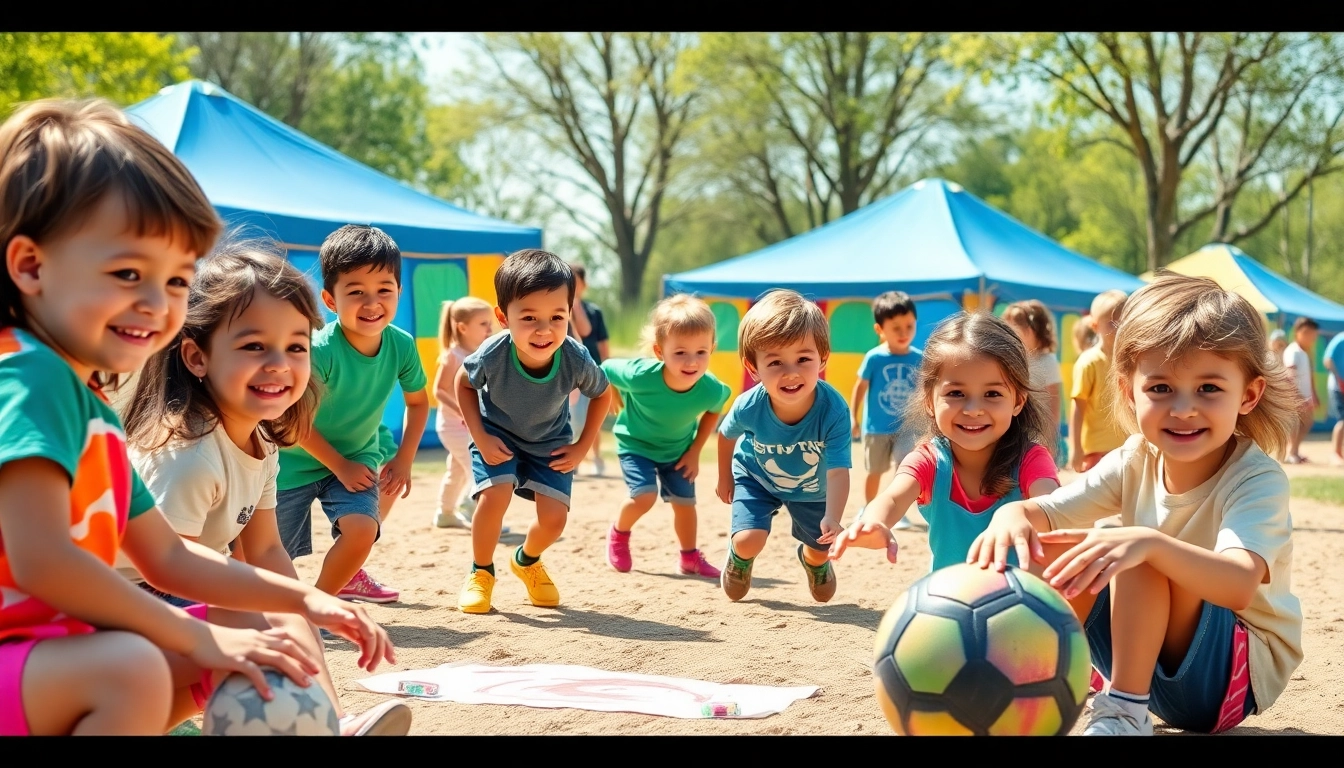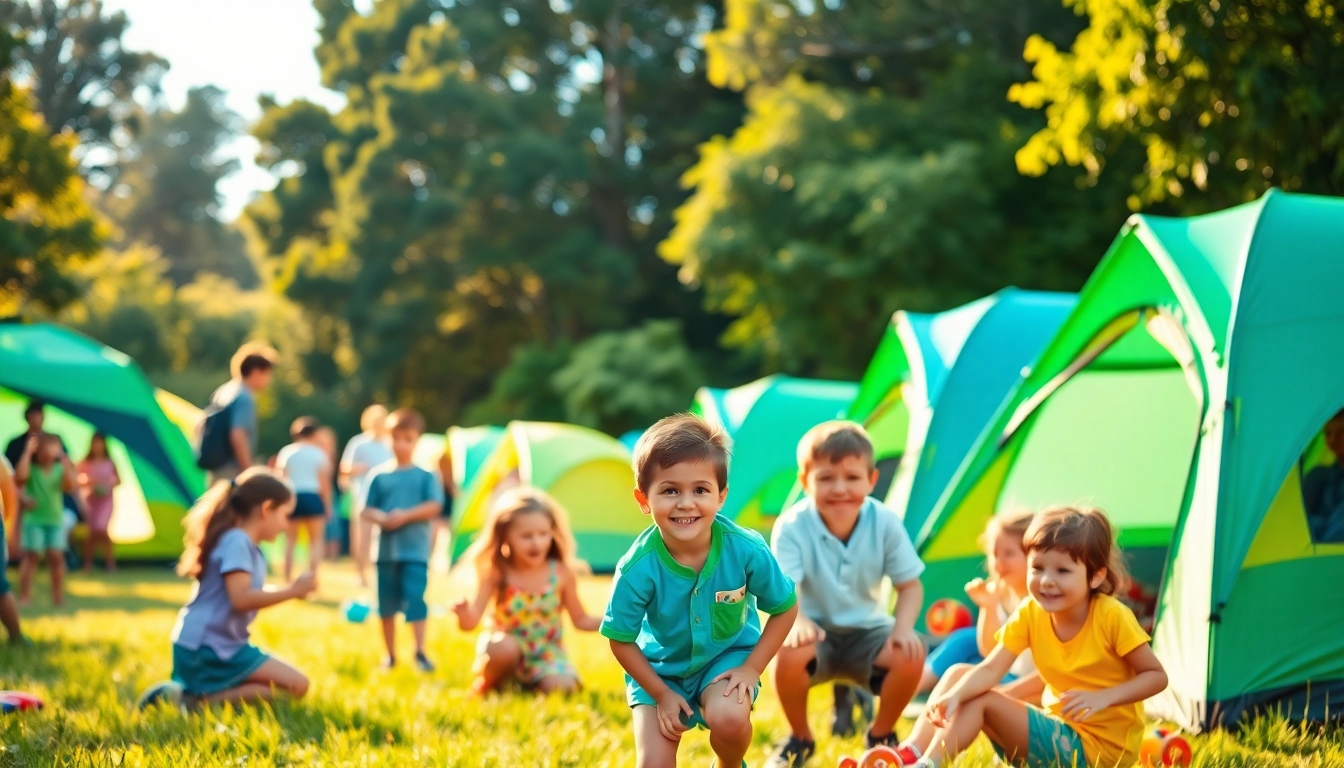Understanding the Importance of Holiday Camps
Holiday camps provide a unique opportunity for children to engage in enriching experiences away from home. These camps serve not just as a way to fill the summer days, but as a crucial component of childhood development. They encourage children to step outside their comfort zones, make new friends, and learn new skills, all while enjoying a break from their usual routines. Holiday camps are designed to cater to different interests, providing a range of engaging activities that stimulate creativity, teamwork, and personal growth.
Benefits of Holiday Camps for Children
The benefits of holiday camps extend beyond mere recreation. Here are some of the significant advantages:
- Social Skills Development: Children learn vital social skills, such as communication, cooperation, and conflict resolution, by interacting with peers.
- Physical Health: Engaging in various physical activities fosters fitness and encourages a healthy lifestyle.
- Confidence Building: Overcoming challenges at camp, such as trying new activities or making friends, boosts self-esteem and independence.
- Learning Opportunities: Camps often include educational activities that promote curiosity and a love for learning in subjects ranging from arts to sciences.
- Nature Connection: Many holiday camps focus on outdoor activities, helping children appreciate nature and understand their environment.
Types of Activities Offered at Holiday Camps
Holiday camps offer a diverse array of activities designed to cater to various interests and age groups. Here are some popular categories:
- Sports and Physical Activities: Camps often include sports such as soccer, swimming, and basketball, promoting teamwork and physical fitness.
- Arts and Crafts: Creativity is fostered through arts and crafts projects that allow children to express themselves and develop fine motor skills.
- Outdoor Adventures: Many camps feature hiking, camping, and nature exploration, connecting children with the natural world.
- STEM Programs: Science, technology, engineering, and math activities are increasingly popular, providing hands-on learning experiences.
- Drama and Performing Arts: Drama camps provide a platform for self-expression, helping children gain confidence and hone their performance skills.
Choosing the Right Holiday Camps for Your Child
Selecting the appropriate holiday camps for your child requires careful consideration. Here are key factors to keep in mind:
- Interests and Preferences: Consider what activities your child enjoys. Camps should align with their interests for maximum engagement.
- Age Appropriateness: Ensure the camp is suitable for your child’s age group in terms of activities and socialization.
- Safety Standards: Research the camp’s safety protocols, including staff qualifications and emergency plans.
- Location and Accessibility: Look for camps that are easy to reach, reducing any travel-related stress for you and your child.
- Reviews and Recommendations: Seek feedback from other parents or look for online reviews to gauge the camp’s reputation.
How to Plan a Perfect Holiday Camps Experience
Planning for a holiday camp experience involves several essential preparations and considerations. Following these steps can help ensure a smooth transition for your child.
Essential Preparations for Parents
Before the camp begins, parents can take several steps to prepare both their children and themselves:
- Registration: Secure a spot at the desired camp by completing all necessary paperwork and payments well in advance.
- Talk to Your Child: Discuss what they can expect at camp, emphasizing the fun aspects and reassuring them about any worries.
- Gather Supplies: Ensure your child has all needed items, including clothing, toiletries, and any specific gear required for activities.
- Health Check: Schedule any necessary health checks or immunizations and provide the camp with health information and emergency contacts.
- Visit the Camp (if possible): If feasible, take your child to visit the camp before the start date to help build excitement and familiarity.
Key Considerations When Selecting Holiday Camps
When examining various camp options, consider the following:
- Camp Philosophy and Values: Look for camps whose philosophies align with your family’s values, including inclusivity and respect for nature.
- Staff-to-Child Ratios: Check the staff-to-child ratios to ensure sufficient supervision and support for all campers.
- Program Structure: Understand the daily schedule, including types of activities and downtime, to ensure a balanced experience.
- Communication: Research how the camp communicates with parents during the camp session to keep you informed about your child’s experience.
- Financial Considerations: Be mindful of the camp’s cost and available financial aid options or scholarships.
Communicating with Camp Staff and Leaders
Open communication with camp staff can improve your child’s experience significantly. Here are some tips for effective communication:
- Establish Points of Contact: Identify who your main point of contact will be before your child starts camp for any queries that arise.
- Discuss Your Child’s Needs: Inform staff about your child’s individual needs, whether they pertain to dietary restrictions, medical issues, or special interests.
- Encourage Feedback Communication: Encourage your child to provide feedback about their day-to-day experiences, fostering open discussions about their feelings.
- Clarify Emergency Protocols: Understand how the camp handles emergencies and what you should do in case of unexpected events.
Making the Most of Holiday Camps Activities
The variety of activities available at holiday camps is often what makes them so enriching. To maximize the experience, understanding how to engage with these activities is crucial.
Outdoor vs. Indoor Activities at Holiday Camps
Both outdoor and indoor activities play a significant role in a camper’s experience. Here’s how they differ:
- Outdoor Activities: These often include hiking, fishing, and team sports, fostering physical fitness and teamwork skills.
- Indoor Activities: Arts and crafts, science experiments, and cooking classes are typically held indoors, promoting creativity and cognitive development.
- Weather Considerations: Camps should be prepared to offer engaging indoor activities in instances where outdoor opportunities are limited due to weather conditions.
- Mix of Activities: A balanced program with both outdoor and indoor activities can cater to diverse interests and keep kids engaged.
Cooperative Games and Team Building
Cooperative games are instrumental in developing teamwork and social skills. Activities that focus on collaboration can help campers:
- Build Trust: Working together fosters trust and understanding among group members.
- Enhance Communication: Team activities encourage participants to express their thoughts verbally and non-verbally effectively.
- Understand Roles: Children learn to appreciate different roles within a group, understanding how to lead and support others.
- Foster Friendship: Sharing experiences during team activities promotes strong bonds among campers, leading to lasting friendships.
Creative Arts and Crafts at Holiday Camps
Arts and crafts at holiday camps provide an excellent outlet for self-expression and creativity:
- Skill Development: Activities such as painting, sculpting, and crafting develop fine motor skills and hand-eye coordination.
- Creative Thinking: Engaging in arts and crafts encourages children to think creatively and approach problems in innovative ways.
- Personal Expression: Through art, children can express their feelings and opinions, nurturing emotional intelligence and awareness.
- Sense of Accomplishment: Completing a project instills a sense of achievement and pride in one’s work.
Safety and Health Measures at Holiday Camps
Safety and health should remain a top priority in any holiday camp environment. Ensuring robust measures are in place helps protect children while they enjoy their experiences.
Understanding Safety Protocols and Guidelines
Every reputable holiday camp should have established safety protocols:
- Staff Training: All staff members must undergo training in first aid and emergency response to handle potential emergencies effectively.
- Clear Guidelines for Activities: There should be established guidelines for each activity to minimize risks and ensure participant safety.
- Supervisory Measures: Ensure that appropriate staff-to-camper ratios are adhered to during activities to maintain safety.
- Safety Equipment: Camps should provide necessary safety equipment for all activities (e.g., helmets for biking or climbing).
Health Considerations for Active Participation
Health considerations greatly impact a child’s ability to participate fully in camp activities:
- Physical Examinations: Be sure your child undergoes a physical examination before camp, ensuring they are fit for activities.
- Dietary Restrictions: Inform camp staff about any dietary restrictions or allergies, and ensure meals accommodate those needs.
- Hydration and Nutrition: Encourage healthy eating and regular hydration before and during camp to promote energy and well-being.
- Breaks for Rest: Acknowledging the importance of rest can prevent fatigue and ensure children are energized for every activity.
Emergency Preparedness During Holiday Camps
Preparing for emergencies is crucial to ensure a safe camp experience:
- Emergency Plans: Camps should have outlined plans for various emergencies like medical issues, severe weather, or natural disasters.
- Communication with Parents: Having a clear communication strategy in place can provide reassurance to parents in case of emergencies.
- Regular Drills: Conduct regular drills with both campers and staff to ensure everyone knows the emergency procedures.
- Emergency Contacts: Keep an updated list of emergency contacts available to staff in case parents need to be reached.
Feedback and Assessment of Holiday Camps
Feedback and assessment are important tools in enhancing holiday camp experiences for the future.
Gathering Feedback from Children and Parents
Listening to feedback from both campers and parents fosters growth and improvement:
- Surveys and Questionnaires: Ask campers and parents to complete surveys after camp to assess their experiences and identify areas for improvement.
- Informal Conversations: Encourage open dialogue between staff and parents/campers to gather insights in a relaxed setting.
- Focus Groups: Hold focus groups to drill down into specific aspects of the camp experience and gather detailed feedback.
Assessing the Impact of Holiday Camps on Development
Evaluating how holiday camps impact children’s development can provide valuable insights:
- Personal Growth: Measure social interactions and personal development through observation and camper reflections.
- Skill Acquisition: Evaluate skill development in areas such as sports, arts, or leadership through assessments before and after camp.
- Academic Performance: Consider tracking changes in academic performance or interests in subjects post-camp, particularly in STEM-focused programs.
Continuously Improving Holiday Camps Experience
Ongoing improvement should be a foundational element for holiday camps:
- Implementing Feedback: Use the feedback gathered to make informed changes to programs and policies for future camps.
- Staff Training and Development: Regularly train staff on new techniques, safety protocols, and innovative camp activities.
- Curriculum Evolution: Continuously update and evolve the camp curriculum to reflect new trends, interests, and educational methods.
- Community Engagement: Involve parents, local community members, and alumni in improving the overall camp experience through collaboration.



